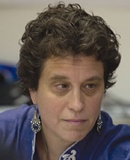Walking through the cavernous exhibit halls of SOCAP this week, you couldn’t help be taken in by the vibrancy of the scene. The setting itself – Fort Mason, an old US army post on the San Francisco bay – represented the kind of transformation that many of the attendees are also seeking.
It was a treat to engage in conversations about the many ways to deploy capital for effective problem solving. It was great to bump into luminaries in the field – like Sir Ronald Cohen, the inspiration behind the whole social impact bond movement, and Jed Emerson, the intrepid pioneer of social enterprise and entrepreneurship. One got the sense that we had a good share of what Nonprofit Finance Fund CEO, Antony Bugg-Levine, calls ‘do-ers’ in the SOCAP crowd. They are a bunch that wants to get good things done in the world.
We were invited to participate in a panel discussion about the first development impact bond in education. Fay Twersky, in her role as a UBS Optimus Foundation board member, discussed UBS’s role as the investor in this bond. Also on the panel were representatives from Educate Girls, a truly impressive NGO in India, the World Bank, the Children’s Investment Fund Foundation and Instiglio, the DIB project manager. Antony Bugg Levine moderated our discussion.
The central question posed to us was: why is UBS Optimus Foundation an investor in this deal? It was a question we were pleased to answer. UBS is a bank; in fact we are the largest wealth management firm in the world. Why does a bank for the very rich care about improving the lives of the very poor? This is a topic UBS’s CEO recently addressed in a white paper on poverty, and the DIB is one of the tools we hope to use in the future as a way for UBS clients to invest directly in solutions designed to help the poor.
Banks like UBS can’t succeed unless societies prosper, or, in the words of SOCAP, unless ‘communities are vibrant’. Communities don’t prosper if we can’t address the needs of the most vulnerable or if the most vulnerable are mired in a perpetual cycle of poverty. The Educate Girls development impact bond aims to develop a pay-for-performance model in India which will provide evidence to demonstrate that more girls are going to school and that they measurably improve their skills in both reading and math. And we all know what happens when we educate a girl. It is a key step in breaking the cycle of poverty and building stable communities. As Safeena Husain, founder and executive director of Educate Girls says, ‘the development impact bond helps us fuel scale as we attempt to reach over a million girls, with funds paying only for pure impact …’
UBS Optimus Foundation hopes this bond will become the proof of concept to promote pay for performance, not only so our clients can invest in the neediest communities, but also so that results-based education becomes more the norm for how governments and donors allocate education funding.
Developing these bond deals can be complex and we realize that we are in the beginning of a new field of practice. But, if we can demonstrate that investments can be made at the bottom of the pyramid with measurable outcomes, we can help create an asset class whereby investors put up the risk capital to solve social problems, and, if targets are met, see some return on their investment. The success of products like this could mark a turning point in the way social investment opportunities are conceived in the future, and, importantly, might attract lots of new resources for effectively solving social problems.
As we were discussing the ins and outs of this ambitious bond in India, to materially change the trajectory of girls’ futures and perhaps the futures of many more to come, a beautiful little bird hopped on to the stage. As we concluded with final reflections, the bird jumped right on to the coffee table where our water glasses were. Perhaps it is a sign that development impact bonds are almost ready for flight.
Fay Twersky is director of the Effective Philanthropy Group at the William and Flora Hewlett Foundation.
Phyllis Constanza is CEO of the UBS Optimus Foundation.







Comments (0)